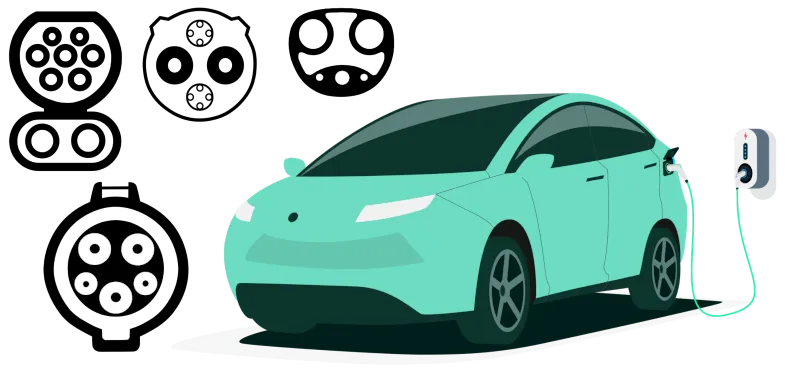What are the different types of EV chargers?EV chargers are classified into the following three types:
Type 1 AC charger (for 110V countries only)The EV manufacturer will usually provide a Type 1 AC charger which is a simple cable that matches the connector on your car and an ordinary wall outlet plug. These chargers typically provide a maximum of 1 kW to 1.8 kW of power and are the slowest chargers available.
Type 2 AC Charger (for 230V countries)Since it uses higher voltage it can deliver between 3 kW to 22 kW and are upto 8 times faster than type 1 chargers. Power input can be single-phase or three-phase. Type 1 and Type 2 chargers deliver AC power to the vehicle and the onboard charger/BMS controls the charging rate and other characteristics. These chargers have a housing that needs to be mounted in the premises.
Type 3 DC Fast ChargingThis is the fastest EV charging type and can deliver from 15 kW to 350 kW allowing the car to be fully charged in under an hour. DC chargers typically use three-phase power input and convert the power to DC so can be sent directly to the battery. These chargers also have a housing that needs to be mounted.
How to choose an EV charger for my car?
Choosing an EV charger depends on the following main characteristics:
EV Charge Acceptance Rate
The charge acceptance rate is the maximum amount of power in kW that the EV can accept. Therefore when buying an EV charger, ensure the output power of the charger matches the charge acceptance rate of the EV for optimal charging.
Car Connector
Depending on the region and whether you are using AC or DC, different connectors are used. Some EV manufacturers also provide adapters that can convert between the pin configurations used in different configurations. Therefore when buying an EV charger ensure you have the correct connector type or neccessary adapters.
Some of the common AC connectors are J1772 (United States/Japan), GB/T AC(China), Type 2 (Europe).
For DC, CHAdeMO (Japan), GB/T DC (China), CCS Type 1 (United States), CCS Type 2 (Europe)
Combined Charging System (CCS) connectors simply add two additional pins for DC to the existing AC connectors used in that particular region.
How long will the charger take to charge my car?
Calculating the actual time to charge a battery cannot be easily done as there are alot of variables, including software and battery limitations, temperature, state of charge, and battery age. However as a general rule of thumb, if you know the battery size and the power rating of your charger you can arrive at an estimated time.
To calculate the charging time, simply divide the battery capacity in kWh by the charger's power rating in kW. For example, using an AC type 2 11 kW charger to charge an EV that has a battery of 70 kWh, we would need an estimated 6-7 hours of charging time.
Is DC fast charging bad for the battery Health?
According to studies, occasional fast charging will not damage battery health but reccurent/constant fast charging does have a negative impact on battery life. Fast charging should not be performed in extreme heat or cold until the battery has preconditioned itself. Preconditioning is performed by the battery's thermal managment system. If the battery is too low or close to fully charged then it will have higher resistance and fast charging has to be avoided.
Therefore DC fast charging should be used when battery level is between 20% and 80% and only using AC charging outside this range to maintain a battery health.

